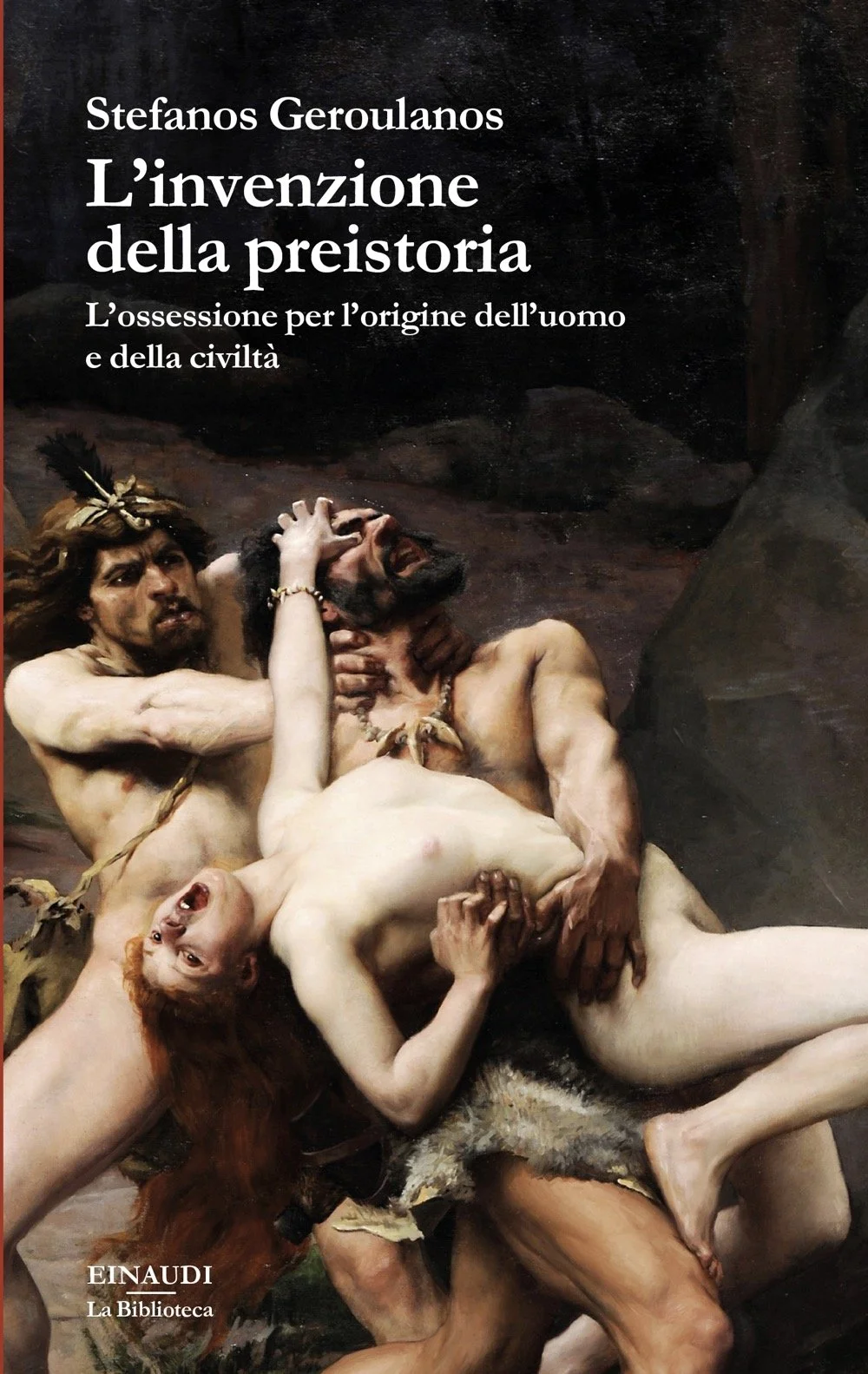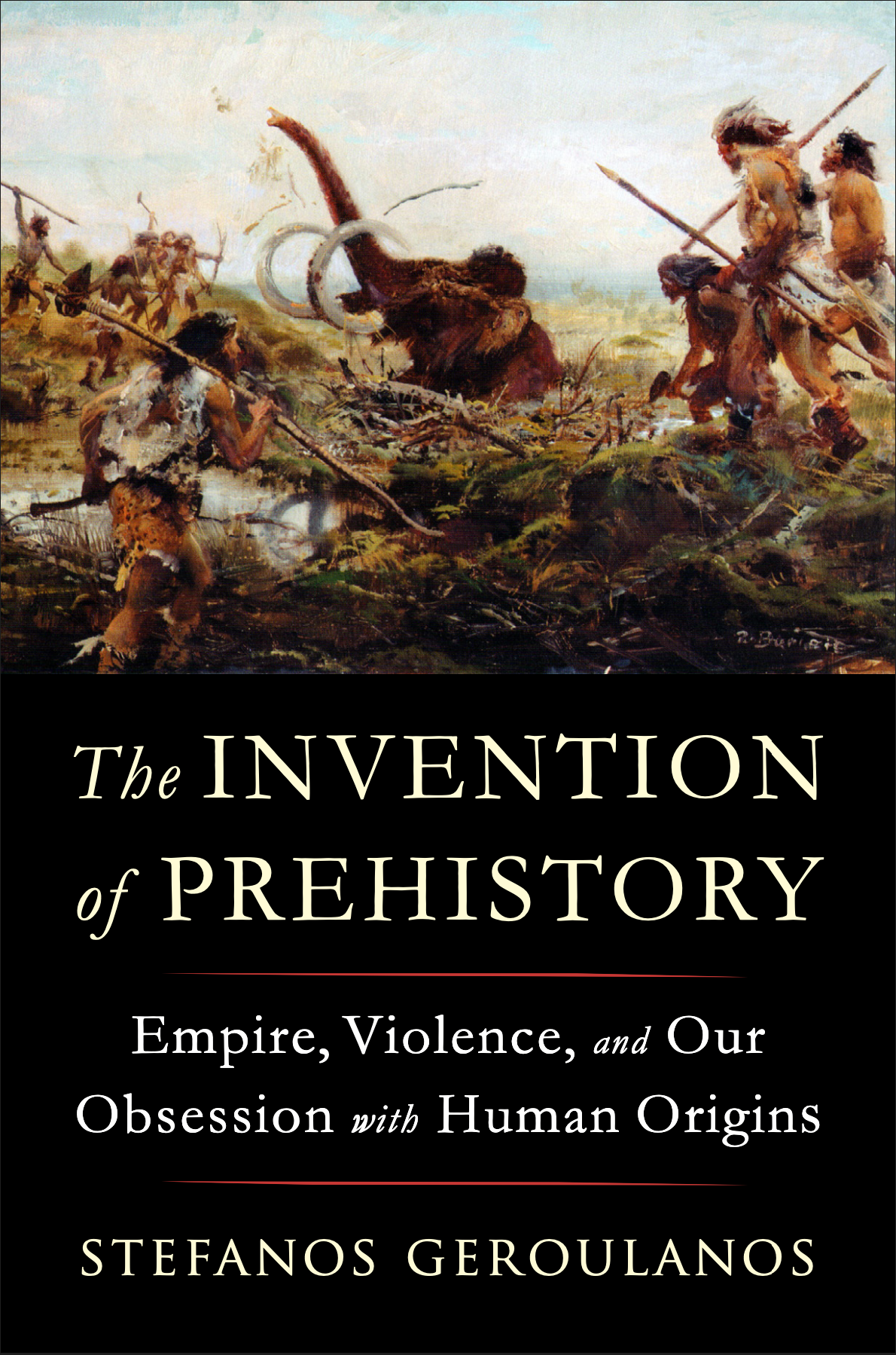The Invention of Prehistory: Violence, Empire, and our Obsession with Human Origins (2024)
Liveright / W. W. Norton (April 2024)
*** Winner, 2025 Ralph Waldo Emerson Award (Phi Beta Kappa)
Italian translation now out! With Einaudi editore (November 2025).
Translations forthcoming: • French (Gallimard) • Spanish (Capitán Swing Libros) • Greek (Patakis) • Turkish (Dergah) • Russian (Alpina) • Taiwan/Complex Chinese Characters (Acropolis).
Prospect Magazine, “Best Books of 2024.” The New Yorker, “The Best Books We Read in 2024” (longlist). LitHub, “50 Noteworthy Nonfiction Books of 2024.” Bloomberg.com, “Best Nonfiction Books of 2024.”
Buy it on amazon. Liveright/Norton website
Publishers Weekly, starred review: “[A]n incisive and captivating reassessment of prehistory . . . In lucid prose, Geroulanos unspools an enthralling and detailed history of the development of modern natural science. It’s a must-read.”
London Review of Books (Oliver Cussen): “An unlikely heir to Voltaire…, Geroulanos insists that our awed ideas about prehistory both rely on and reproduce essentialist concepts of the human that prevent us from taking responsibility for the present, or from thinking about alternative futures.”
The New York Times (Jennifer Szalai): “[Geroulanos] has plenty of praise for geneticists and paleontologists who have enlarged our understanding of various areas of inquiry, including human migration, food intake and the Neanderthal genome. What both fascinates and troubles him is our seemingly irrepressible urge to look to the lives of early humans — to that mysterious time before recorded history — to tell us who, essentially, we are. Not to mention that such interpretations can condition how we relate to others: Prehistoric “findings” have been used to shore up a prejudice, justify an injustice or expand an empire.”
Pankaj Mishra (author of Age of Anger and The World after Gaza): “Nimbly moving across a great expanse of space and time, The Invention of Prehistory dismantles our most widely accepted ideas about the origins of humanity. This is intellectual history as it should be written: serene in its mastery of intransigent material, yet endlessly provocative in argument, and ultimately fatal to long-cherished assumptions and prejudices.”
Kirkus Reviews, starred review: “An astute, powerfully rendered history of humanity.”
The New Yorker (Maya Jasanoff): “With careful attention to our collective accounting of our prehistoric roots, Geroulanos considers what is revealed about our present when we write about our past.”
The Wall Street Journal (Kyle Harper): “The strength of Mr. Geroulanos’s book lies in its breadth. It ranges easily from … Freud and Jung (for both of whom idiosyncratic notions of prehistory were important) to Nazi obsessions with origins, Unesco debates about racism and modern feminist strains of social theory. Mr. Geroulanos has a good ear for prose and a knack for defamiliarizing expressions that should seem stranger: His pages on the phrase “the thin veneer of civilization,” for example, are extraordinary…. The problem of prehistory remains enormous, indeed, and it is humbling to be reminded of its abuses.”
The Washington Post (Becca Rothfeld): “In The Invention of Prehistory, a thorough and sensitive work of reckoning, Geroulanos shows that both wistful and disdainful depictions of the past have been used to justify atrocities in the present... it complicates the increasingly widespread narrative that paints pining for the past as an exclusively conservative pastime.... As Geroulanos so decisively demonstrates, many groups throughout history—not least the Nazis—'relied on theories of origins as a justification to rule and to kill'.”
The Economist: “A sweeping exploration of Western ideas about early humankind… shows that theories about the ancient past have exerted a strong and sometimes pernicious influence on the modern world.”
The New Republic (Udi Greenberg): “Original and exciting . . . dazzling . . . ends with an impassioned call for radical modesty. It is time for us to admit that we simply do not know the deep past and cannot comprehend the ‘ecstasies and feelings and terrors’ that our predecessors experienced. This recognition will then allow us to root advocacy for solidarity and equality on firmer grounds.”
Chronicle of Higher Education: “Geroulanos has done a redoubtable job of showing the ways in which the study of the human past has been deformed by prejudice, mythmaking, and outright racism.”
The New Statesman (Ann Manov): “The relationship between a society’s imagination of prehistory and its views of indigenous peoples is Geroulanos’s most engrossing theme.”
Mosse Program Blog (Giuliana Chamedes): “Scintillating… Geroulanos is one of the world’s leading scholars of European intellectual history and the author of several field-changing books on how concepts emerge and morph over time…. With a dazzling array of sources, and through playful and erudite prose that carefully pries open texts, images, and the straitjacket of language itself, Geroulanos shows why these particular questions have become dominant modes of engaging our deep past. He explores why our tropes—’civilized’ vs. ‘savage,’ ‘good’ vs. ‘evil,’ ‘justified violence’ vs. ‘brutish violence’—have become so familiar, and predictable.”
Books about the origins of humanity dominate bestseller lists, while national newspapers present breathless accounts of new archaeological findings and speculate about what those findings tell us about our earliest ancestors. We are obsessed with prehistory―and, in this respect, our current era is no different from any other in the last three hundred years. In this coruscating work, acclaimed historian Stefanos Geroulanos demonstrates that claims about the earliest humans not only shaped Western intellectual culture, but gave rise to our modern world.
The very idea that there was a human past before recorded history only emerged with the Enlightenment, when European thinkers began to reject faith-based notions of humanity and history in favor of supposedly more empirical ideas about the world. From the “state of nature” and Romantic notions of virtuous German barbarians to theories about Neanderthals, killer apes, and a matriarchal paradise where women ruled, Geroulanos captures the sheer variety and strangeness of the ideas that animated many of the major thinkers of the eighteenth and nineteenth centuries, including Rousseau, Darwin, and Marx. Yet as he shows, such ideas became, for the most part, the ideological foundations of repressive regimes and globe-spanning empires. Deeming other peoples “savages” allowed for guilt-free violence against them; notions of “killer apes” who were our evolutionary predecessors made war seem only natural. The emergence of modern science only accelerated the West’s imperialism. The Nazi obsession with race was rooted in archaeological claims about prehistoric IndoGermans; the idea that colonialized peoples could be “bombed back to the stone age” was made possible by the technology of flight and the anthropological idea that civilization advanced in stages.
As Geroulanos argues, accounts of prehistory tell us more about the moment when they are proposed than about the deep past―and if we hope to start improving our future, we would be better off setting aside the search for how it all started. A necessary, timely, indelible account of how the quest for understanding the origins of humanity became the handmaiden of war and empire, The Invention of Prehistory will forever change how we think about the deep past.
Merve Emre (author of The Personality Brokers): “Stefanos Geroulanos reveals how the quest for human origins emerged from the imperial mandate—to possess the earth and control its peoples. His subtle, passionate book steers us away from an unreal past and toward an equal, peaceful, and sustainable future for all.”
Samuel Moyn (author of Humane and The Last Utopia): “In a brilliant masterstroke, Stefanos Geroulanos turns the tables on those shining a lamp on human origins, documenting how they have always held up a mirror to themselves and their own times. Accessibly and expertly explicating a dizzying array of theories of early society, and their stories of antediluvian psyches, cyclical violence, dominant mothers, hominid predecessors, simian cousins, and tribal peoples, this magnificent book reminds us that inquiry is always political—and that the continuing fashion of exploring the birth of civilization and the dawn of everything have the darkest roots.”
Andreas Malm (author of Fossil Capital): “The idea that some people have stayed behind in a savage state while others have ascended to civilisation has caused and continues to cause immense suffering for those supposed to be human animals, bombed back to the stone age or otherwise disappeared from history. Covering an enormous territory from Rousseau to Wakanda, displaying a firework of erudition, written with verve, The Invention of Prehistory will be a milestone on the path to a less destructive relation to the deep past.”
Amia Srinivasan (author of The Right to Sex):“In this remarkable and enlivening study, Stefanos Geroulanos traces the development of our modern fascination with humanity’s deep past, and lays out that fascination’s deadly costs.”



